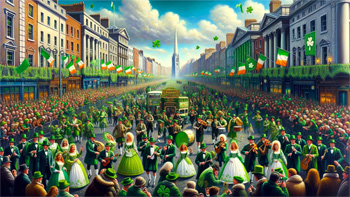 Saint Patrick's Day in Ireland
Saint Patrick's Day in Ireland


Saint Patrick's Day, celebrated on March 17th, is one of Ireland's most famous and widely celebrated festivals, known for its vibrant parades, green attire, and spirited festivities. While it has become a global phenomenon, in Ireland, it retains a special significance, rooted in Irish history and tradition. This day, dedicated to the patron saint of Ireland, Saint Patrick, is not only a cultural and religious observance but also a celebration of Irish identity and heritage. In this article, we explore the origins, traditions, and contemporary celebrations of Saint Patrick's Day in Ireland, offering a glimpse into the heart of Irish culture and festivity.
The Historical Significance of Saint Patrick's Day
Saint Patrick's Day, celebrated on March 17th, honors Saint Patrick, the patron saint of Ireland, who played a crucial role in bringing Christianity to the Irish people. The historical significance of this day is deeply rooted in Irish culture and history. Saint Patrick, who lived during the 5th century, is credited with using the three-leaved shamrock to explain the Holy Trinity to the pagan Irish, and this symbol has now become synonymous with the celebration. Originally a religious feast day and a day of holy obligation for Catholics in Ireland, Saint Patrick's Day gradually evolved into a secular celebration of Irish culture and heritage, recognized and celebrated around the globe.
Over the years, Saint Patrick's Day has become a symbol of Irish pride and identity, transcending religious boundaries. The day commemorates the resilience and spirit of the Irish people, reflecting on their rich history, folklore, and the ability to spread their culture worldwide. It's an opportunity to honor the legacy of Saint Patrick, remember the struggles of the past, and celebrate the unity and strength of the Irish community.
Traditional Celebrations in Ireland
In Ireland, Saint Patrick's Day is celebrated with a variety of traditional customs and rituals. The day begins with many attending mass, reflecting the day's origins as a religious feast. Families gather to enjoy a meal, often featuring Irish staples such as bacon and cabbage. The wearing of green attire or shamrocks is a well-known tradition, symbolizing the arrival of spring and the lush landscapes of Ireland. In many households, the day is also marked by the preparation of traditional Irish soda bread and the sharing of stories and folklore related to Saint Patrick and Irish history.
Another cherished tradition is the 'drowning of the shamrock' where a shamrock is placed in the bottom of a cup, which is then filled with whiskey, beer, or cider. It's then drunk as a toast to Saint Patrick, Ireland, or those present. After the drink is finished, the shamrock is either swallowed or taken out and tossed over the shoulder for good luck. This tradition encapsulates the Irish spirit of camaraderie and the importance of heritage and folklore in the celebration of Saint Patrick's Day.
Parades and Public Festivities
Parades and public festivities are the most visible and vibrant manifestations of Saint Patrick's Day in Ireland. The streets come alive with the sound of traditional Irish music, dance performances, and the cheerful chatter of parade-goers. The Saint Patrick's Day parade in Dublin is particularly renowned, drawing visitors from all over the world. The parade features elaborate floats, marching bands, and performers, all showcasing the creativity and cultural richness of the Irish people.
These public festivities are not only a display of national pride but also a reflection of the inclusive and welcoming nature of Irish culture. People of all backgrounds come together to enjoy the festivities, creating a sense of community and shared celebration. The atmosphere is one of joy and togetherness, highlighting the communal spirit and the importance of celebration in Irish culture. Parades and public festivities on Saint Patrick's Day provide a platform for artists and communities to express their identity, share their culture, and celebrate the enduring legacy of Ireland's patron saint.
Global Influence and Celebrations
Saint Patrick's Day's global influence is evident with major celebrations in countries like the United States and the United Kingdom. In the U.S., cities host grand parades and festivities, with unique traditions like Chicago's green-dyed river capturing the spirit of the day. Similarly, in the UK, Saint Patrick's Day is marked by cultural events in cities with significant Irish communities. These global celebrations, blending Irish culture with local customs, highlight the widespread appeal and cultural impact of Saint Patrick's Day beyond Ireland.
Contemporary Observances
In contemporary Ireland, Saint Patrick's Day is seen as an opportunity to celebrate Irishness and promote cultural heritage. It's a day that transcends religious connotations, becoming a celebration of Irish identity and community spirit. The festival includes various events such as art exhibitions, music concerts, and theatrical performances, showcasing the richness of Irish culture and arts.
Saint Patrick's Day in Ireland remains a vibrant, joyful celebration, deeply woven into the fabric of Irish society. It is a day that honors the past while celebrating the present, showcasing the strength and spirit of the Irish community. Whether you're in Ireland or anywhere else in the world, Saint Patrick's Day offers a chance to experience and participate in the joy and culture of Ireland. The day's global popularity only adds to its charm, turning it into a worldwide celebration of Irish heritage and a testament to the lasting impact of Irish culture on the world stage.